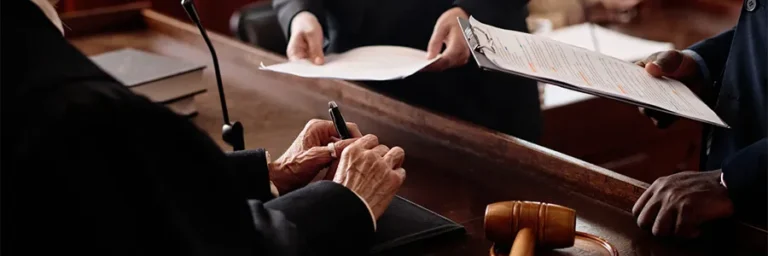You’ve waited many months to finally receive a hearing date. The prospect of attending a disability hearing often induces anxiety, and the hearing process itself is a stressful prospect. Disability claimants should take comfort in the fact that the hearing office is not like any courtrooms you see on TV or in the movies. Your hearing will not involve a jury, an opposing counsel, a public gallery, a bailiff, or the hammering of any gavels. An administrative hearing is much different than a civil or criminal court proceeding. Think of the hearing as your opportunity to have an honest conversation with the judge about the medical reasons you are no longer able to work. Here are some answers to common questions about the hearing process itself, followed by a section on best practices for the day of your hearing. Hopefully these answers will make the hearing process as stress free as possible.
Who is present at the hearing?
Your Social Security disability hearing will be held in a private room. In most cases, the only people in the room are the judge deciding your case, the judge’s assistant, your attorney, and a “vocational expert”. A vocational expert’s job is to give impartial testimony regarding jobs in the national economy available for people with certain workplace limitations due to their disability. The judge and your lawyer will ask the vocational expert hypothetical questions at the end of the hearing.
Most vocational experts testify over the phone. Sometimes in complex cases a “medical expert” is randomly assigned to give impartial testimony. The medical expert is also an impartial witness, similar to the vocational expert, who has reviewed your medical records and will give testimony based on your disability. The medical expert will usually testify at the beginning of the hearing, over the phone, before the judge hangs up and begins asking questions of you, the disability claimant.
What is the Process?
At the beginning of the hearing, the judge will ask you to take an oath and swear to tell the truth. Other than this formality, there are no rules of evidence or complicated legal formalities to worry about. Your disability hearing will be conversational in nature, not an interrogation. The judge will ask you questions about where you live, your age, education, work experience, and what keeps you from working now. The judge will also ask you about what you do on a typical day, whether you have trouble performing basic activities of daily living such as cooking, cleaning, laundry, driving, or grocery shopping. You should generally know the medications you are taking, the last time you worked, and your work experience for the past 15 years. You should also be able to provide a fairly detailed explanation regarding how your physical or mental impairments prevent you from working. The hearing itself will usually last no more than an hour.
How should I dress?
There is no need to dress in formal clothing. The hearing is not a job interview. You should wear whatever clothes you would normally wear when going out in public.
Should I present any witnesses?
The short answer is usually no. The disability claimant is usually in the best position to testify about the impact of their impairments on the ability to work. Plan on bringing a close family member or friend for moral support before and after the hearing, but they should not plan on testifying in front of the judge. Sometimes interpersonal dynamics can get in the way of a coherent presentation of your medical situation in front of the judge. If you want to include the opinion of a family member or friend, have them fill out and submit a Third Party Function Report (SSA-3380) or complete a narrative statement on a form SSA-795 and submit those documents to the hearing office in advance of the hearing. Your doctor will not testify since their medical records should have been requested to support your claim for disability. In some cases it can be advantageous to have a close friend or family member testify. It’s best to talk to a disability lawyer before the hearing about this decision.
Will I find out the outcome at the hearing?
Sometimes the judge will state their decision on the record at your hearing. In most cases however, the judge will mail the final decision within two to three months after the hearing. It can be frustrating to learn on the day of the hearing that you’ll have to wait even longer to find out about your disability decision, but understand that the judge must weigh all the evidence in your case, including your hearing testimony, and write a thorough and detailed hearing decision. The process of reviewing a medical file, which can contain thousands of pages of medical records, takes time. Roughly two to three months after the hearing, you’ll receive a copy of the judge’s decision in the mail. This notice is called a “Notice of Decision”. If you have been approved, the decision will read “Fully Favorable”. If your case has been denied, your decision will read “Unfavorable”. If the judge has decided that your date of disability began on a different date than your alleged onset date – the date you said you became disabled on your disability application – the decision will read “Partially Favorable”. Similarly, if the decides that your disability lasted for the period of at least 12 months, but that your disability ended either due to a return to work or due to medical improvement, the decision will read “Partially Favorable”.
After the Hearing
What should you do after you receive a decision from the judge who heard your disability case? Wait for a letter from Social Security called a “Notice of Award”. The “Notice of Award” is a separate piece of correspondence than the “Notice of Decision”. Once your case is approved by the judge, the Social Security payment center must then process the judge’s decision. Social Security employees will read the judge’s decision to determine how much back pay you are entitled to. They will calculate your back benefit, then calculate your ongoing monthly payment, and generate a letter explaining your benefit and when you will start receiving ongoing monthly disability checks. Please note, sometimes the payment center will process your payment before you receive a notice of award. Some of our clients are understandably surprised to find a substantial deposit in their checking account before receiving their “Notice of Award”. We advise clients to wait until they receive their “Notice of Award” before touching the deposited funds in their checking account.














